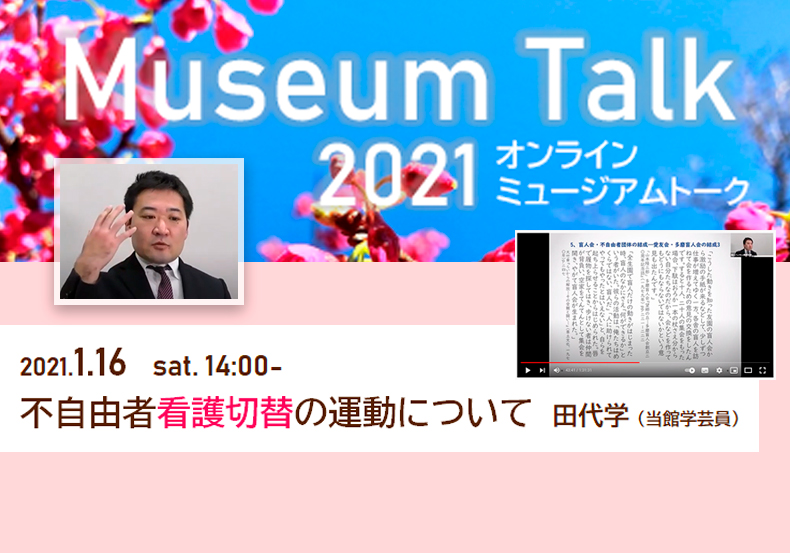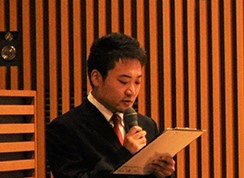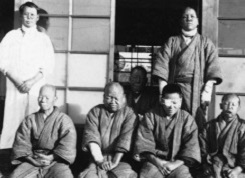Event details
- Top
- event information
- Event List
- [Event Report] Museum Talk 2021 (1st online event)
2021.01.29
[Event Report] Museum Talk 2021 (1st online event)
*The event has ended.

You can watch a recording of the day's Switching of nursing for the disabled campaign on YouTube.
Lecturer Manabu Tashiro (curator of the The National Hansen's Disease Museum
Leprosy sanatorium, people who need help in their daily lives due to blindness or limb disorders are called "disabled people," and in the past, mildly ill patients and Former leprosy patients provided nursing care as Patient procedures.. I would like to introduce the exhibits and photographs of the The National Hansen's Disease Museum along with related texts to deepen my thoughts on the Patient exercises (Tashiro)


Outline of the event
Saturday, January 16, 2021, 14:00 to 15:30, Zoom broadcast
Advance registration required, capacity 100 people (first come, first served)
Registration opens on the day of the event at 13:45
Report on the movement to Switching of nursing for the disabled
Lecturer Manabu Tashiro (curator of the The National Hansen's Disease Museum
Today's museum talk was centered around a large-scale "6/5 struggle" that was carried out by Resident Association of sanatoriums nationwide in order to switch staff for nursing for the disabled. Among them, a difficult life emerged in which people with disabilities who were in a position to receive nursing / long-term care, especially visually impaired people, took the lead in exercising. There were many participants from remote areas as well as from the neighborhood, and many questions were asked, and the event was a great success.
We will continue to deliver museum talks on various themes regarding the Issues related to leprosy, making use of the impressions received from questionnaires.
From the questionnaire
- Thank you for making valuable time today. When I was listening to the story, I was often shocked. In particular, I Patient procedures)" and "I can't see, I can't even hold a pen with my feet ...". "How to create hope to live". I think this is the current theme of Corona. I would like to study more about the history of Hansen's Disease I am looking forward to the next museum talk.
- I was very interested in the problems of Patient procedures
- Thank you for your valuable story based on the results of the special exhibition held at your museum two years ago. At the beginning, the nursing home was not a facility that could be called a "sanatorium" in terms of medical care and welfare, in which patients with the same disease were responsible for nursing and long-term care ("accompaniment"). It seems that the change of staff gradually changed into a substantial "nursing home" for the first time. I feel the need to reorganize the history of sanatoriums from such a perspective as well as the results of law abolition / amendment and trials.
- For the first time, I learned about the fact that care for the disabled.
- This time, Switching of nursing for the disabled", but I have had the Hansen's Disease from the perspective of discrimination theory, and it makes me think again about how to create a composition that gives birth to vulnerable groups. It was a good opportunity. In order to protect our lives, I think there were many hardships that could not be expressed by words and letters alone in the process of raising our voices and acquiring rights and compensation. I was able to trace the records of the patients this time, and I think I was able to reflect on the thoughts and complaints of those days as much as possible.
I am grateful to hear the lecture at this time as a reference material for how we face the unknown horror and face our new living environment now that we are in the corona wreck. Thank you very much. - It was very good to be able to read the thoughts of that era because many materials were presented in their original text. However, it is a pity that the progress was so fast that I could not take a closer look at the materials.
- Thank you for your valuable story. In an era of prejudice, how many people understood the coverage of the 6.5 movement at that time? And was there a commentary report on it? Discrimination triggered by illness is the same in the current corona sickness. The discrimination extends not only to affected individuals but also to their families and health care workers. It made me feel once again how difficult it is to eliminate discrimination once it has taken root.
… We have received many other answers. Thank you very much.
